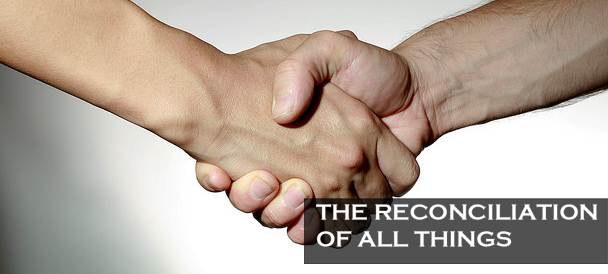For the entire law is fulfilled in keeping this one command: “Love your neighbour as yourself.” Galatians 5:14
I love to simplify. Much of my job for the last 10 years has been to take less than easy concepts and teach them to people with little to no education. I enjoy the challenge of sitting down and pondering what is the most essential thing that we need to know on any topic. If we strip away everything but the core, what would be left?
When it comes to the Old Testament, Paul, in Galatians 5:14 helps us out. He summarises the entire law. The summary, for me, is unexpected. I would have anticipated the summary to be ‘love God.’ And yet, it’s not, it’s ‘love your neighbour.’ If you are anything like the crazy task-orientated, list-obsessed person I am, that’s not great news. If anything it’s sobering.
As we look at the ALL that Jesus came to reconcile, one of those things is our relationship to one another. It’s not hard to see how quickly the fall took us from perfection to bickering. By Genesis 4, we already have the first recorded murder. The rest of the Old Testament (or just the evening news) makes it clear that without the Cross things cannot improve. The fact is, one of the reasons Jesus died was to reconcile us to each other. The New Testament spells out clearly what that should look like: husbands loving, wives respecting, children honouring, employees obeying, church members in unity, everyone loving, serving, rejoicing and weeping together. It’s hardly the description of earth today.
But we are called to be ministers of reconciliation, to bring restoration to our relationships with each other. Or more simply, to love our neighbour. It’s hardly a new idea, but as we ponder that thought here are four areas to evaluate yourself on.
Family – How are your relationships with your immediate family? Your extended family? Are there any relationships what wouldn’t meet the standard of loving one another? Take time to reflect and pray about what God would have you do. It might be anything from a marriage retreat to sending a note to a cousin you haven’t spoken to in years.
Church – The Bible has a lot to say about the unity of believers. It describes us as a body (1Cor. 12:12-13, 27). Jesus in his final days before the cross prayed, “I pray also for those who will believe in me through their message, that all of them may be one…. May they be brought to complete unity to let the world know that you sent me” (John 17:21, 23). What is one of the signs to the world that Jesus was sent from God? The unity of the church. While we may love those in our own church family, what about those down the road? Or those we disagree with? Do we love? Do we seek common ground? Or do we have an “us and them” attitude that, at best, keeps them at arms length?
Community – Yep, those people outside the door, in the surrounding houses. Our literal neighbours. Do we love them? Do we know their names? Do we know how to pray for them today? If not then start by praying that God will give you opportunities to build relationships. You don’t need a plane ride to find a mission field. It’s usually easily found in your own neighbourhood.
The Vulnerable – God’s heart for the vulnerable is clear throughout the Bible. Isaiah 58 lays it out in clear terms. The Israelites were fasting and praying and yet God refused to listen. Why? Because of the way they treated one another, the oppressed and the poor. Then there’s a story in Galatians 2 that I’ve always found shocking—when the apostles called in Paul to discuss his preaching to the Gentiles, they had one request of him: ‘continue to remember the poor.’ Paul responds that this is ‘the very thing I was eager to do.’ There’s little need to point out the numbers of those in need around the world. If you have made it to this blog, you’re already concerned. But the question is, does that concern impact your actions on a daily basis? Is helping the poor ‘the very thing you are eager to do?’ Eager? Let’s pray for hearts like Paul, that we would be eager to help the vulnerable, poor and oppressed.
Jesus came to reconcile so much. Our relationship with Him is fundamental, but the outworking of that is reconciliation with others (aka ‘love’). In fact, 1 John 4:20 goes so far as to say, ‘whoever does not love their brother and sister, whom they have seen, cannot love God, whom they have not seen.’ As we look at our relationships with each other, I challenge you to take a few moments right now to evaluate how you are doing in the four areas of family, church, community and the vulnerable.
Image courtesy of Richard Busch / Flickr.com


Leave A Comment